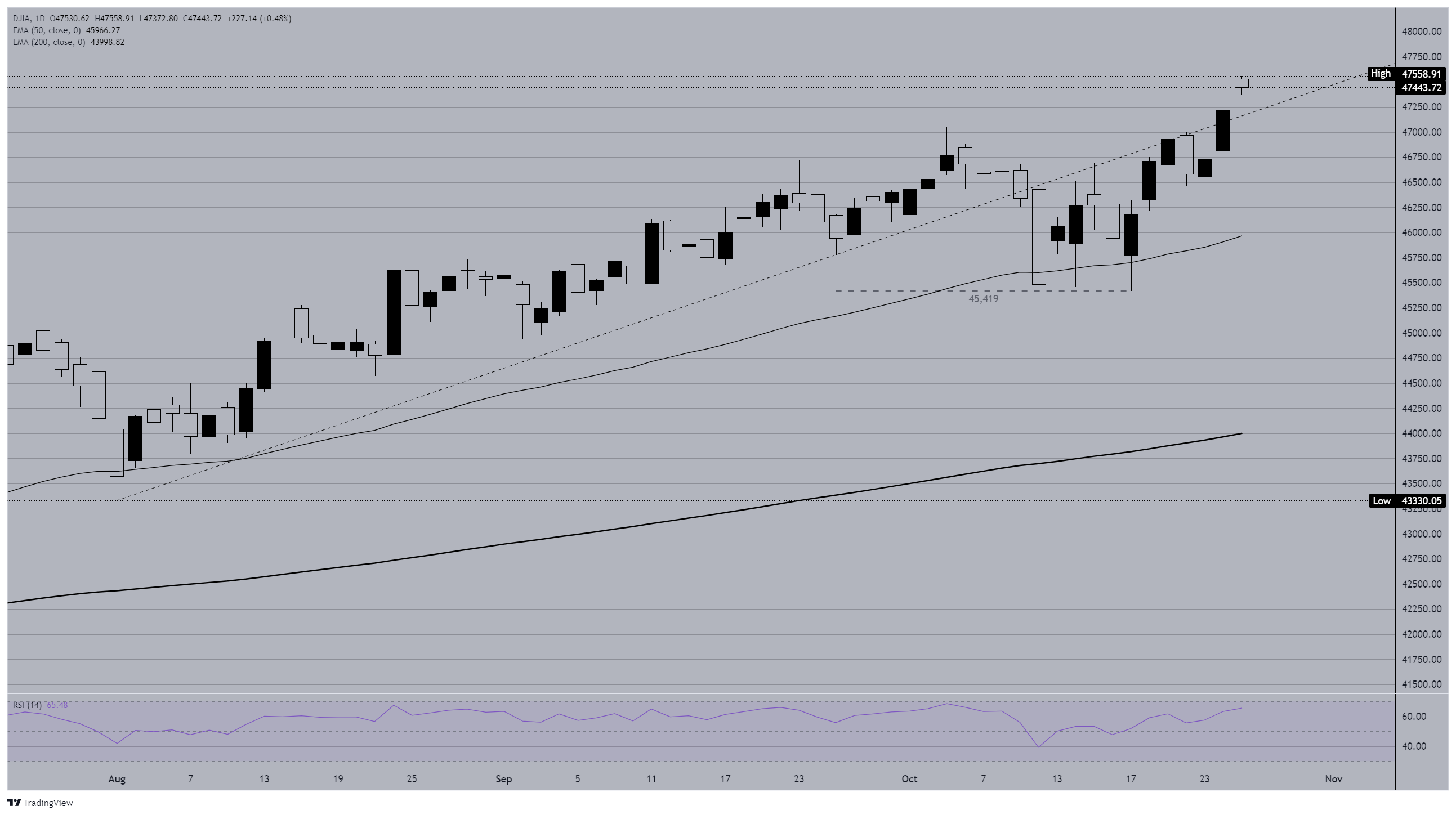Created
: 2025.10.28














![]() 2025.10.28 01:53
2025.10.28 01:53
The Dow Jones Industrial Average (DJIA) climbed into a fresh record high in early Monday trading, poking through 47,500 for the first time ever as investors continue to recover their sentiment footing. Markets are betting that another last-minute trade deal between the US and China will avert the worst of President Donald Trump's threatened tariffs.
Threatening new, steep tariffs and then finding a reason to walk them back at the eleventh hour has become a dedicated habit for the Trump administration, giving investors plenty of reason to bank on another walkback of a fresh 100% (but sometimes 155%) tariff on China that is theoretically set to come into effect on November 1. There remains little evidence that China will be walking back its recent pivot into further restricting foreign access to domestic rare earth minerals markets, other than general lip service that the new policy will be reviewed following fresh trade discussions. Nor is there any word on removing a new port fee for foreign cargo ships that moor at Chinese docks.
Key tech companies will be releasing third-quarter earnings throughout the week as the latest earnings season continues to grind on. Five of the 'Magnificent Seven' are on deck for earnings releases this week, including Google parent Alphabet (GOOG), Amazon (AMZN), Apple (AAPL), Facebook parent Meta (META), and Windows publisher Microsoft (MSFT).
The key event this week will be the Federal Reserve's (Fed) latest interest rate decision, slated for Wednesday. A follow-up quarter-point interest rate cut is functionally a done deal as far as rate markets are concerned, and the key highlights from this week's rate call will be how interested the Fed sounds in delivering a third straight rate cut at its subsequent rate meeting in December.

The Dow Jones Industrial Average, one of the oldest stock market indices in the world, is compiled of the 30 most traded stocks in the US. The index is price-weighted rather than weighted by capitalization. It is calculated by summing the prices of the constituent stocks and dividing them by a factor, currently 0.152. The index was founded by Charles Dow, who also founded the Wall Street Journal. In later years it has been criticized for not being broadly representative enough because it only tracks 30 conglomerates, unlike broader indices such as the S&P 500.
Many different factors drive the Dow Jones Industrial Average (DJIA). The aggregate performance of the component companies revealed in quarterly company earnings reports is the main one. US and global macroeconomic data also contributes as it impacts on investor sentiment. The level of interest rates, set by the Federal Reserve (Fed), also influences the DJIA as it affects the cost of credit, on which many corporations are heavily reliant. Therefore, inflation can be a major driver as well as other metrics which impact the Fed decisions.
Dow Theory is a method for identifying the primary trend of the stock market developed by Charles Dow. A key step is to compare the direction of the Dow Jones Industrial Average (DJIA) and the Dow Jones Transportation Average (DJTA) and only follow trends where both are moving in the same direction. Volume is a confirmatory criteria. The theory uses elements of peak and trough analysis. Dow's theory posits three trend phases: accumulation, when smart money starts buying or selling; public participation, when the wider public joins in; and distribution, when the smart money exits.
There are a number of ways to trade the DJIA. One is to use ETFs which allow investors to trade the DJIA as a single security, rather than having to buy shares in all 30 constituent companies. A leading example is the SPDR Dow Jones Industrial Average ETF (DIA). DJIA futures contracts enable traders to speculate on the future value of the index and Options provide the right, but not the obligation, to buy or sell the index at a predetermined price in the future. Mutual funds enable investors to buy a share of a diversified portfolio of DJIA stocks thus providing exposure to the overall index.
![]()
Created
: 2025.10.28
![]()
Last updated
: 2025.10.28

FXStreet is a forex information website, delivering market analysis and news articles 24/7.
It features a number of articles contributed by well-known analysts, in addition to the ones by its editorial team.
Founded in 2000 by Francesc Riverola, a Spanish economist, it has grown to become a world-renowned information website.
We hope you find this article useful. Any comments or suggestions will be greatly appreciated.
We are also looking for writers with extensive experience in forex and crypto to join us.
please contact us at [email protected].
Disclaimer:
All information and content provided on this website is provided for informational purposes only and is not intended to solicit any investment. Although all efforts are made in order to ensure that the information is correct, no guarantee is provided for the accuracy of any content on this website. Any decision made shall be the responsibility of the investor and Myforex does not take any responsibility whatsoever regarding the use of any information provided herein.
The content provided on this website belongs to Myforex and, where stated, the relevant licensors. All rights are reserved by Myforex and the relevant licensors, and no content of this website, whether in full or in part, shall be copied or displayed elsewhere without the explicit written permission of the relevant copyright holder. If you wish to use any part of the content provided on this website, please ensure that you contact Myforex.
Myforex uses cookies to improve the convenience and functionality of this website. This website may include cookies not only by us but also by third parties (advertisers, log analysts, etc.) for the purpose of tracking the activities of users. Cookie policy